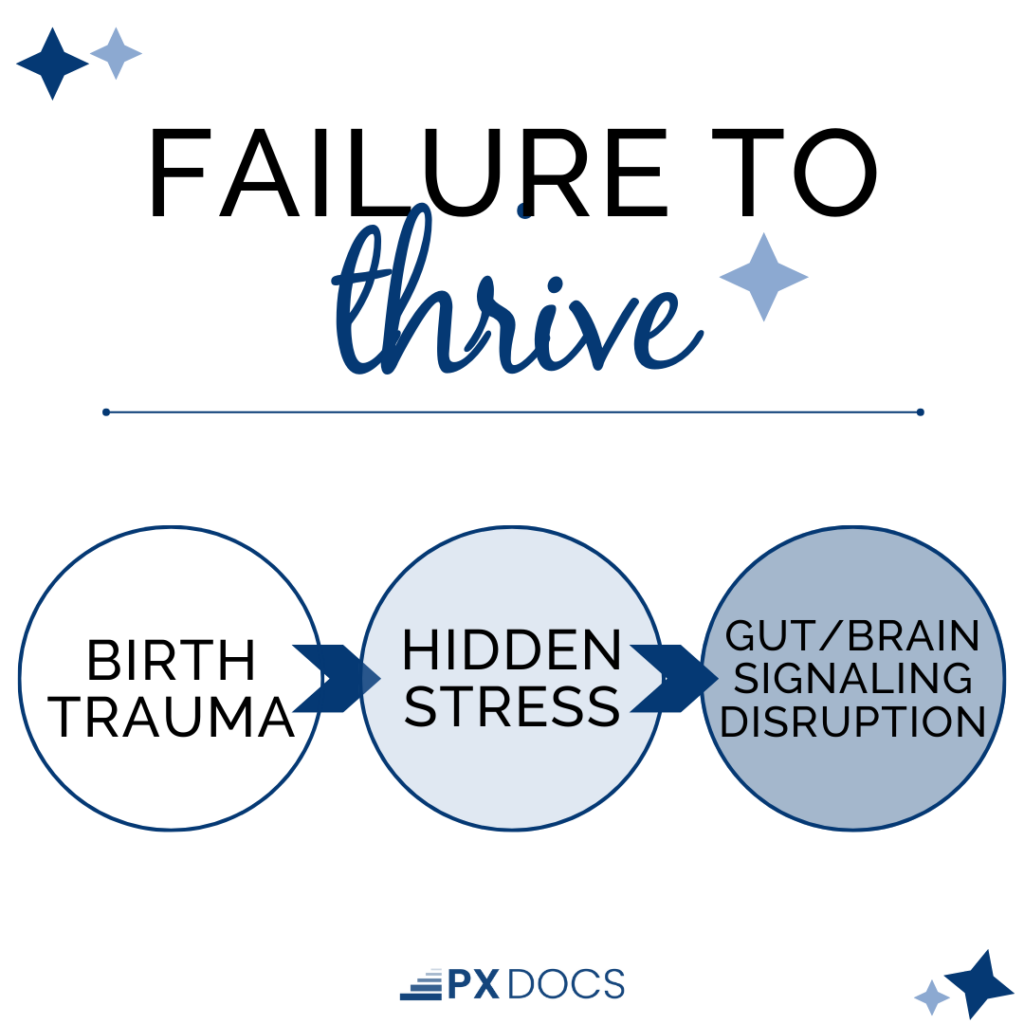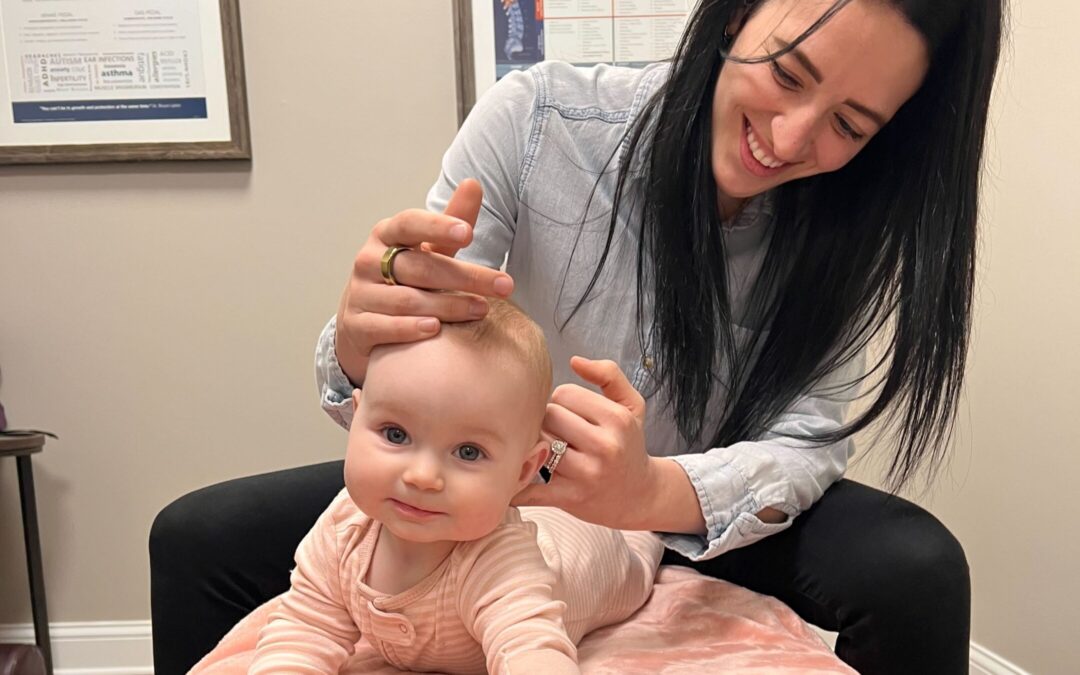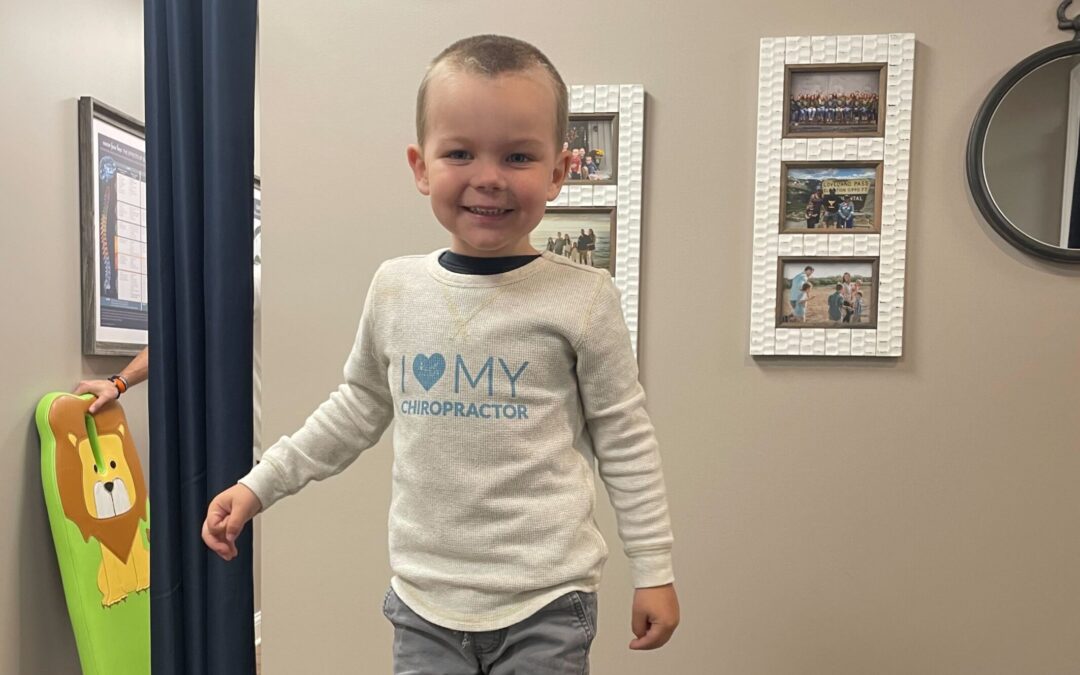Failure to thrive (FTT) in babies is a critical issue that demands attention from both healthcare professionals and parents. FTT is not merely about being small or underweight; it’s a warning signal that a child may not be receiving adequate nutrition or has underlying health concerns. Early identification and intervention are crucial in ensuring the healthy growth and development of a child.
Unfortunately for so many parents, they are desperately searching for answers and explanations as to what’s really causing their infant to struggle so much but get little to no help from their traditional pediatrician or medical team when specific underlying medical diseases or conditions are ruled out. Up to 80% of cases of failure to thrive fit this criteria, where no known direct medical cause or condition can be found to explain it.
This in-depth article was written for parents whose child is struggling to gain weight and grow appropriately. It aims to provide clear answers and explanations beyond what traditional medical testing and care may offer.
Whenever traditional medical testing for digestive function, nutritional intake, and overall health come up empty, it’s a sure sign that the dysfunction and root cause of the problem is deeper within the body. More specifically, it’s a sign that the central or autonomic nervous system has gotten off track with your little one, which then leads to downstream effects like difficulty eating, absorbing and assimilating nutrients, and gaining weight.
What is Failure to Thrive in Babies?
Failure to Thrive (FTT) is a significant pediatric concern characterized by a child’s growth and weight gain falling substantially below the expected levels for their age and sex. It’s important to recognize that FTT is not a specific disease but rather a symptom that may indicate an underlying dysfunction or health issues that need to be addressed.
FTT can have severe implications on both physical and mental development, necessitating prompt attention to identify and address potential medical, nutritional, or environmental causes. Early intervention is vital for a child’s overall health and development.
The first step in this cascade is to consult with your pediatrician and medical provider to rule out any causative pathological condition or underlying disease that may be causing these problems with digestion, absorption, and weight gain. For many parents who have found this article however, they’ve already taken that step, consulted with a whole team of medical experts, and likely came up empty.
Medical Conditions Linked to FTT
Specific medical conditions that can lead to FTT include gastrointestinal disorders, metabolic disturbances, and chronic infections. These conditions can impair nutrient absorption, increase metabolic demands, or reduce appetite, all contributing to inadequate growth.
Signs of Failure to Thrive in Newborns
Common signs of FTT include poor weight gain, reduced appetite, and delayed development milestones. These signs differ from normal growth variations in their persistence and severity. Unlike typical fluctuations in appetite and growth, FTT symptoms are consistent and indicate a more profound health issue.
Causes of Failure to Thrive
As already discussed, certain anomalies within the anatomy and physiology of the intestinal tract or mechanisms related to latching, swallowing, and ingesting food may play a role in the development of failure to thrive. However, once these medical conditions are ruled out, the real root cause of FTT often escapes traditional medical testing and understanding.
The most common clinical observation pattern we continue to see with failure to thrive infants and children struggling to grow, gain weight, and keep up developmentally overall is a deeper level of neurophysiological dysfunction and imbalance called dysautonomia. Dysautonomia is a condition most frequently triggered when the infant is exposed to a significant amount of distress during the prenatal period, labor and delivery, and the first few weeks to months of life.
Time and again, we see this underlying birth trauma and injury to the neurospinal system, known as subluxation, as the most commonly overlooked aspect of infant health challenges as far ranging as colic, reflux, constipation, and even failure to thrive.
If there is more emotional, physical, and chemical trauma than their nervous system can handle and adapt to, it will most commonly shift into a sustained sympathetic state. This fight-or-flight sympathetic response is not designed to be perpetually active and switched on because one of the first physiological reactions of a sympathetic response is to shut down gut and digestive function, in order to preserve energy for the fight-or-flight response.
Routinely, we find that infants and young children who have been exposed to what we call “The Perfect Storm” of stressors, such as a high-stress or high-risk pregnancy, birth interventions such as forceps, vacuum extraction, induction, and c-section. And then, those who perhaps have already had a round or two of antibiotics and medications are the most stressed and most locked into sympathetic overdrive and dysautonomia.
So, while most traditional and natural health providers will look at failure to thrive as purely a nutritional imbalance, when we look deeper at the case history and examine the nervous system of these children, we see an even deeper layer of foundational dysfunction locked into the central and autonomic nervous system.

Diagnosing Failure to Thrive
Diagnosing FTT involves a comprehensive assessment including medical evaluations and growth chart analysis. Healthcare providers assess dietary intake, growth patterns, and familial health history to identify potential causes.
Once again, as Neurologically-Focused Pediatric Chiropractors, we worry less about the diagnosis and what to call the problem and more about the root cause and how to address it and care for it head on.
The Role of Pediatric Chiropractic Care in Supporting Failure to Thrive Infants
Like every other condition or case cared for by a Pediatric Chiropractor in the PX Docs Network, we do not seek to diagnose, treat, or cure failure to thrive. Instead, the entire focus of our care plan is to find the root neurophysiological dysfunction, address it, and help the body return to optimal balance and overall function.
If the nervous system remains locked into that sustained sympathetic state of imbalance and dysfunction, then it’s likely the infant will continue to struggle with eating, digestion, absorption, and assimilation of nutrients. However, when a trained and experienced PX Doctor can make safe, gentle adjustments to release that pent up sympathetic stress and subluxation patterns, the child’s nervous system can then shift back into a more balanced, parasympathetic “rest, digest, and assimilate” state.
Properly trained Pediatric Chiropractors can play a crucial role in identifying root cause issues contributing to FTT and other problems in infants like colic and constipation, as they focus on the nervous system’s role in growth and development and can detect subtle imbalances that might impact a child’s ability to properly function and thrive.
Integrative Approaches to Managing FTT
We also encourage families of failure to thrive infants to work with an integrative pediatrician or nurse practitioner to address any underlying food intolerances or nutritional deficiencies. However, in many cases, the subluxation and dysautonomia components may be contributing to an excessive inflammatory cascade and immune reaction in the first place, so it’s important to address the neurological dysfunction first and foremost.
Supporting Your Child’s Growth and Development
Parents can support their child’s health by working with their local PX Doctor to appropriately care for neurological function and development, as well as provide a calm and nurturing environment, ensure adequate nutrition, and monitor developmental milestones. When you pair Neurologically-Focused Chiropractic Care with a healthy, natural, toxin-free lifestyle, children grow and thrive at an incredible rate!
Get Full Support for Failure to Thrive Today
Getting a full understanding of what’s really going on with failure to thrive, not just nutritionally but neurologically as well, is essential for parents and providers to make sure we can get these precious little ones out of the sympathetic storm and struggle they may have begun life in, but don’t need to stay in!
We’ve seen countless infants respond so well to their adjustments and chiropractic care, resulting in better latching, digesting, absorbing, and growing! It doesn’t always happen overnight, but with the right combination of high level medical care to rule out any serious medical condition and advanced Pediatric Chiropractic care like that provided by your local PX Doctor, your child can get to the other side and thrive once again.
If you’re concerned that your child may have these underlying neurological dysfunctions and imbalances, get scheduled for a consultation and examination with your local PX Doctor today. You can do so easily by checking out our directory here, and filling out a form that will get you in touch with an office and community of support right away!





